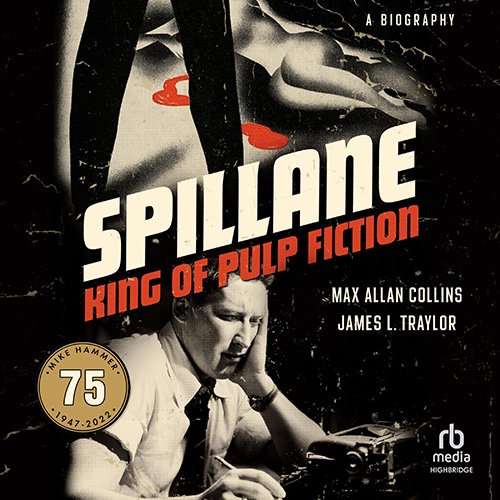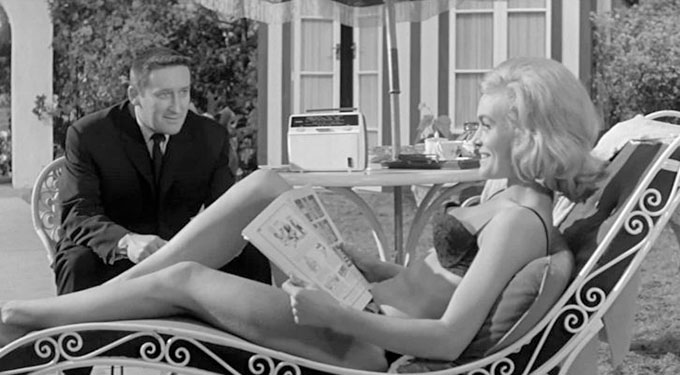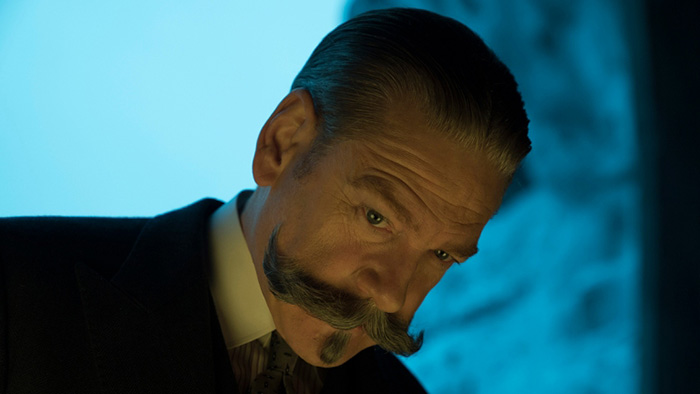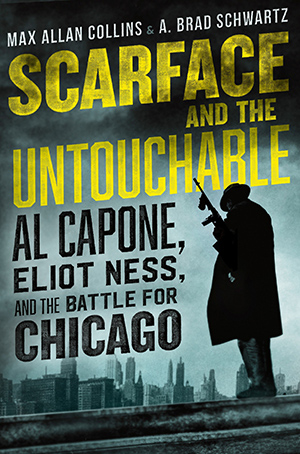Let’s start with this terrific review in the Washington Post of Spillane – King of Pulp Fiction:
In my early teens I raced through all the Spillane paperbacks I could unearth, so I quickly devoured “Spillane: King of Pulp Fiction” (Mysterious Press), by Max Allan Collins and James L. Traylor. With no-nonsense concision, it describes Spillane’s early career in comics, his jump into writing novels, the adaptation of his work into movies (most notably the noir classic “Kiss Me Deadly”), the various Mike Hammer TV shows and the later spy thrillers about Tiger Mann. The authors also discuss Spillane’s personal life, his three marriages and — paradoxical as it may seem — this tough-guy writer’s membership in the Jehovah’s Witnesses.
There’s only one caution I would make to a prospective reader of “Spillane: King of Pulp Fiction.” It’s forthrightly full of spoilers, so that Collins and Traylor can trace the connections among the early novels as Mike Hammer works through some formidable residual guilt. This openness about Spillane’s plots may have been unavoidable, but if I were about to begin “Vengeance Is Mine” (1950) or “The Long Wait” (1951) for the first time, I’d rather not know their tricky secrets.
Last week, in a fit of petty panic, I disliked another writer’s work in public. I thought I was just being frank and knowingly exposing my frailties and frustrations; but I broke a rule. Writing fiction is hard. Writing fiction for a living is harder. Just typing a book-length manuscript is arduous.
So I shouldn’t criticize any other fiction writer in public. Not ever. And it’s rare that I do, and I was in fact reacting in frustration (and, later in the same post, expressing embarrassment at having done so) about a biography of that writer, a book I felt would impinge upon the chances of Spillane – King of Pulp Fiction getting an Edgar nomination.
Let’s start there. The Edgars, all awards in the mystery fiction firmament (all entertainment/arts awards, actually), are a will o’ the wisp thing. The MWA committees are comprised of members – publishing mystery writers – whose collective tastes will shift as the membership of these committees changes from year to year. So one committee can nominate a recent Ness non-fiction book without previous committees nominating either of the two (I feel definitive, groundbreaking) Ness books written by Brad Schwartz and me not long ago. At the same time, I can write Nate Heller books that are honored by the Private Eye Writers of America and other mystery writer organizations and never get an Edgar nomination for any of them. And then, out of nowhere, Quarry’s Blood can receive an Edgar nomination. I’d call it a crap shoot, but I think it goes well beyond that.
So even thinking about the ramifications of the publication of another mystery-writer biography, as far as Edgar and other award nominations for Spillane are concerned, is an absurd waste of time. It wouldn’t surprise me if neither book got a nomination. Or both did. Or one.
As I’ve said here before, nominations and award wins are good for the ego – a fairly fleeting feeling – but are most valuable as a marketing tool. I do my best to chart the good, bad and in between of reviews without taking any of it seriously beyond whether a review provides what’s called a “pull quote” (a blurb taken from a review, sometimes the only good thing said about a book in that review). That’s how “The best reason to show why Max Allan Collins must never be published again” becomes “The best…Max Allan Collins must…be published again.”
I stopped formally reviewing books and movies a long time ago. I felt with novels that it was unfair to the writer – the great Tony Hillerman wrote a bad review of an early Heller novel and it struck me as what they now call “punching down.” And I knew Tony a little from playing poker with him at Bouchercons, and it hurt me that a writer of his stature would pan my stuff, particularly since we were at least friendly acquaintances. Frankly, it still stings.
I stopped reviewing books because it seems like a chef reviewing somebody else’s restaurant – it’s an obvious conflict of interest. It’s lacking in grace, whether you’re a big writer panning an up-and-comer, or an up-and-comer attacking a big writer. When I made my first independent film (Mommy, 1995), I learned how hard it was to make a movie, and the difficulties the process entailed. I think Mommy is a good little movie, but I also know that it’s difficult to make even a bad movie. I truly hope Gene Siskel has been sentenced to Purgatory until he is able to make a movie as good as Ed Wood’s worst.
So I stopped writing movie reviews (I was the first regular Mystery Scene film critic) with the exception of a column in a now-defunct magazine devoted to Asian genre films, largely because I am such a movie buff I couldn’t help myself. Also, somehow I didn’t think I was threatening Hong Kong and Japanese filmmakers with my opinions.
Then these updates/blog entries came along and I drifted back into expressing my opinions about movies and TV. Not every time, but now and then. I try to limit myself to movies and TV I like, but I often slip. Early on these updates were more strictly just me hawking my wares, and my son Nathan said I needed to include other content – which led to “sort of” reviewing again and definitely sharing my personal thoughts about the craft and the business of writing.
My role model for this was my late friend Harlan Ellison, whose personal intros to short stories and columns in his collections really revealed the Man Behind the Curtain. My wife Barb, however, after the last few updates, said pointedly, “Careful you don’t become Harlan Ellison.” Harlan was a notoriously opinionated and combative writer and by the end of his life was viewed as something of a curmudgeon.
I defended myself by reminding Barb that at (nearly) 75 I had a right to be a curmudgeon; but she did not accept that argument.
Okay, then, James Ellroy. I have nothing against him personally, and we used to run into each other now and then and
always were friendly. He was unfailingly gracious to me. I was working the historical noir side of the street before him (not by much, but I was) and it’s probably natural that I would resent and even be jealous of his commercial and critical success.
That I don’t care for his approach is irrelevant. What I don’t like about it is something I don’t care to discuss, as it gets into that reviewing area. For a writer of fiction to be truly envious of another writer of fiction requires the former to be willing to trade books with the latter. I would not trade Angel in Black for The Black Dahlia no matter how much more money and acclaim it might bring me – writers have nothing but their own work to justify their presence on the planet.
So why does Ellroy remain something of a a thorn in my side? I’m sure I’m not even a gnat annoying his field of vision. It’s the fans. The readers. Some of you out there. So it occurs to me that it’s time to put down some rules, and we’ll start with the fans.
RULES FOR FANS (IN PERSON AND IN CORRESPONDENCE)
1. Do not tell a writer that he or she is one of your two favorite authors and then announce who the other author is. Particularly don’t go on and on about that other author. (I have heard that James Ellroy is someone’s other favorite writer countless times – probably because, again, we both work the historical noir side of the street.)
2. Do not tell a writer that you want to be a writer, too, and particularly don’t send that writer your manuscript or even request sending it. You are supposed to be interested in the writer you admire, not vice versa. And most writers have been told by their attorneys not to read other people’s unpublished work because of potential accusations of plagiarism.
3. Ask first before sending a book to be signed and, when you’re given the go-ahead, provide a self-addressed postage-attached envelope.
4. Do not share with the writer which books he or she wrote that you considered the weakest. In particular, don’t praise early books at the expense of later ones.
RULES FOR EDITORS
1. Do not take authors out for lunch on their visits to New York or at mystery conventions and tell them about other authors on your list you think are really great. More specifically, don’t tell a writer that a manuscript that just came in by, for example, James Ellroy is really, really terrific.
2. Do not take offense when you present something as a “suggestion” and the author doesn’t take it. If it’s really a change you feel needs to be made, be forthright about it. I would much rather have an editor insist on changes than just decide to stop working with me because I didn’t follow what he or she requested. Home work assignment: look up meaning of “suggestion.”
3. Inform the copy editor that line editing is your job and that the copy editor has not been hired to be a co-author.
RULES FOR WRITERS
1. Don’t review the books of other writers.
2. Don’t bitch about a movie ruining your book if you cashed the check.
3. Be patient with readers who may be nervous meeting you and think you are important in some way.
4. Understand that you are not important in any way, and that it’s a privilege to lie for a living.
The above are not complete lists, and don’t deal with things like writers making deadlines and editors returning calls.
So, of course, here’s some quick reviews.
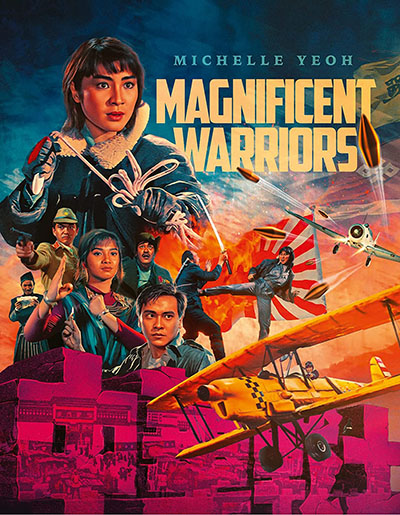
Out on Blu-ray from 88 Films, Magnificent Warriors features a very young Michelle Yeoh – decades before Everything Everywhere All At Once – displaying her incredible martial arts skills and a charming, casually charismatic appeal. This has several of the greatest action sequences ever filmed, truly jaw-dropping stuff. Be prepared for the Chinese not to like the Japanese very much.
Marlowe with Liam Neeson from director/co-writer Neil Jordan is an abysmal misfire of a Phillip Marlowe movie, from a continuation novel (not Chandler). It’s shot in Ireland and Spain and is the worst approximation of Los Angeles in the Chinatown era I’ve ever seen, not surprising because it’s the worst period private eye movie I’ve ever seen. Neeson (who actually says “I’m getting too old for this” at the close of an awkward action scene) is adequate but everyone else hams it. Scenes end before they begin, incoherence poses as art, and dialogue approximates neither Chandler nor recognizable human speech. I went home and re-watched a 1947 Marlowe movie, The Brasher Doubloon (from The High Window) with George Mongomery as a mustached Marlowe. I always thought this one was lousy, and now it looks not bad at all. And James Garner’s Marlowe movie is starting to look like a minor masterpiece.
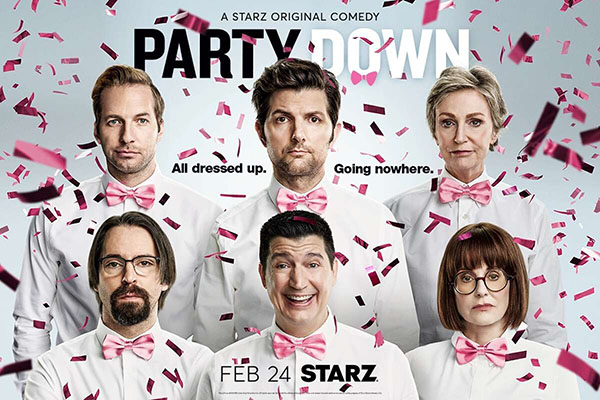
Party Down, the Hollywood catering comedy from various Veronica Mars talent, is back on Starz after a brief thirteen-year hiatus. I’ve seen one episode and it’s already clearly the best show on television, painfully hilarious, with Ken Marino, Adam Scott and Jane Lynch standouts, though Martin Starr steals the show as a cynic who sees everyone else’s frailties except his own (he’s a sci-fi geek who once wrote an epic novel on a roll of toilet paper).

No, wait, Poker Face is the best show on television. Barb and I almost bailed after the first episode’s wrap-up seemed to promise a Columbo Meets the Fugitive premise for the series, with Natasha Lyonne having a superpower of sorts in her ability to detect lying. Nate nudged us to keep trying, and while it’s clearly a tribute to Peter Falk’s great detective, The Fugitive aspect is played down, and the lying shtick well-handled. Tons of great stars stop by to take the ride. Wanna see Nick Nolte playing a Ray Harryhausen type? You’re in luck! Episode eight.
Here’s an interesting take on my first Batman issue (!). Check out my comment as well.
Scroll down for some more nice Rap Sheet coverage of Spillane – King of Pulp Fiction.
Guess what Collider thinks is one of the ten best Prohibition era gangsters movies.
M.A.C.
